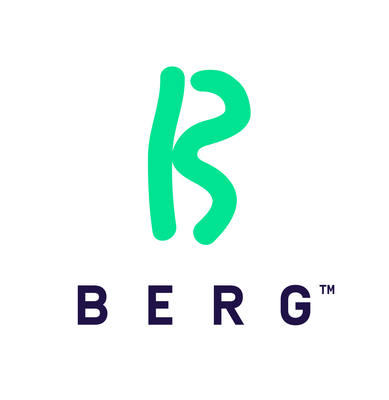BERG Presents Clinical Target Validation Data for the Treatment of Parkinson's Disease and Novel Mechanism of Action in Neurological Disorders at Neuroscience 2018
BOSTON, Nov. 7, 2018 /PRNewswire/ -- Berg LLC, a Boston-based biopharmaceutical company that merges biology with technology to map the nature of diseases, today announced four abstracts showcasing the value of its Back to Biology™ approach in identifying disease signatures and mechanisms of Parkinson's disease (PD) and other neurological disorders were presented at the annual meeting of the Society for Neuroscience (SfN) in San Diego, California, Nov. 3-7, 2018.

Cognitive decline and alterations in motor coordination are some of the earliest symptoms detected in patients with mild cognitive impairments or Parkinson's disease, respectively, and enhanced understanding of molecular pathways surrounding these has the potential to greatly improve translation of preclinical research toward therapeutic and diagnostic development. BERG's proprietary Interrogative Biology® platform and bAIcis® artificial intelligence (AI) tool utilize multi-omic profiling and represent one of the most robust platforms for the diagnosis, prognosis and understanding of neurological diseases.
Key presentation highlights include:
- Pre-clinical data identifying promising molecules and pathways as target candidates for major depressive disorder.
- Pre-clinical metabolic signaling data with potential to distinguish between age-related changes in the brain and age-related cognitive decline in Alzheimer's disease.
- In vitro data suggesting mechanistic link between leucine-rich repeat kinase 2 (LRRK2), p53 inducible gene 3 (PIG3) and PD-related neurodegeneration.
- Neurometabolomic and phenotype data supportive of PIG3 as a novel therapeutic target in PD-specific pathologies.
"BERG is leading the way in discovering new therapeutic targets to treat Parkinson's disease and other neurological disorders by identifying critical links in the neurodegeneration process utilizing our Interrogative Biology platform and AI-driven research into the pathology of disease," said Niven R. Narain, Ph.D., BERG Co-founder, President and Chief Executive Officer. "Our Back to Biology approach has further identified novel profiles driving disease activity – such as LRRK2 mutation and PIG3 expression – that we believe hold great potential for novel treatments for patients suffering from progressive, debilitating neurodegenerative disorders."
Details of the poster presentations are as follows and are available via the Neuroscience 2018 website:
Title: Multi-omic analyses of brain and serum from chronically stressed mice reveal network disruptions in purine metabolism, fatty acid beta-oxidation, and antioxidant function that can be ameliorated upon antidepressant treatment
Session: 315
Program Number: 315.13 / SS9
Date & Time: November 5, 2018, 8:00 a.m. – 9:00 a.m. PT
Location: Halls B-H
Title: A longitudinal analysis of hippocampal metabolomic alterations following cognitive decline in aged mice and APP/PS1 Alzheimer's disease mice
Session: 466
Program Number: 466.05 / F8
Date & Time: November 6, 2018, 8:00 a.m. – 9:00 a.m. PT
Location: Halls B-H
Title: p53 inducible gene 3 (PIG3) directly modulates apoptotic responses in human neuronal models of Parkinson's disease in vitro
Session: 655
Program Number: 655.23 / Q11
Date & Time: November 7, 2018, 10:00 a.m. – 11:00 a.m. PT
Location: Halls B-H
Title: Altered cellular and metabolomic phenotypes observed in LRRK2G2019S patient-specific iPSC-derived neurons are partially rescued in PIG3-deficient cells
Session: 655
Program Number: 655.24 / Q12
Date & Time: November 7, 2018, 11:00 a.m. – 12:00 p.m. PT
Location: Halls B-H
About Parkinson's Disease
Parkinson's Disease (PD) is a chronic and progressive neurological disease that is marked by tremors in the resting muscles, rigidity, slowness of movement, impaired balance, in addition to non-motor symptoms such as behavioral changes and cognitive impairment.1 It's estimated that 930,000 people in the United States will be living with PD by the year 2020, and predicted to rise to 1.2 million by 2030.2 There currently is no cure for the disease, which is the 14th leading cause of death in the United States.3
About BERG
BERG LLC is a clinical-stage, artificial intelligence-powered biotech leveraging its proprietary platform, Interrogative Biology®, to map disease and revolutionize treatments across oncology, neurology and rare diseases. By taking a Back to Biology™ approach, BERG is able to identify critical biomarkers that can accelerate the discovery and development of treatments aimed at the most promising therapeutic targets and pathways. BERG has leveraged both Interrogative Biology and traditional R&D methods to develop a robust pipeline of first-in-class product candidates and diagnostics that advance bold innovations that have the potential to improve patient lives. To learn more about how we're enabling bold innovation, visit berghealth.com.
Media Contact:
Chris Dougherty
Ogilvy
917-515-9876
BERG@Ogilvy.com
BERG Investor Contact:
Molly Cameron
BERG
617-588-1000
Molly.Cameron@BergHealth.com
References:
- About Parkinson's Disease. National Institutes of Health Accelerating Medicines Partnership. https://www.nih.gov/research-training/accelerating-medicines-partnership-amp/parkinsons-disease#about. Accessed November 7, 2018.
- C. Marras, J.C. Beck, J. H. Bower, et al. Prevalence of Parkinson's Disease Across North America. npj Parkinson's Disease. 2018;4(21);1-7.
- J. Xu, S. Murphy, K. Kochanek, et al. Deaths: Final Data for 2016. Natl Vital Stat Rep. 2018;67(5); 1-76.
![]() View original content to download multimedia:http://www.prnewswire.com/news-releases/berg-presents-clinical-target-validation-data-for-the-treatment-of-parkinsons-disease-and-novel-mechanism-of-action-in-neurological-disorders-at-neuroscience-2018-300746182.html
View original content to download multimedia:http://www.prnewswire.com/news-releases/berg-presents-clinical-target-validation-data-for-the-treatment-of-parkinsons-disease-and-novel-mechanism-of-action-in-neurological-disorders-at-neuroscience-2018-300746182.html
SOURCE BERG
